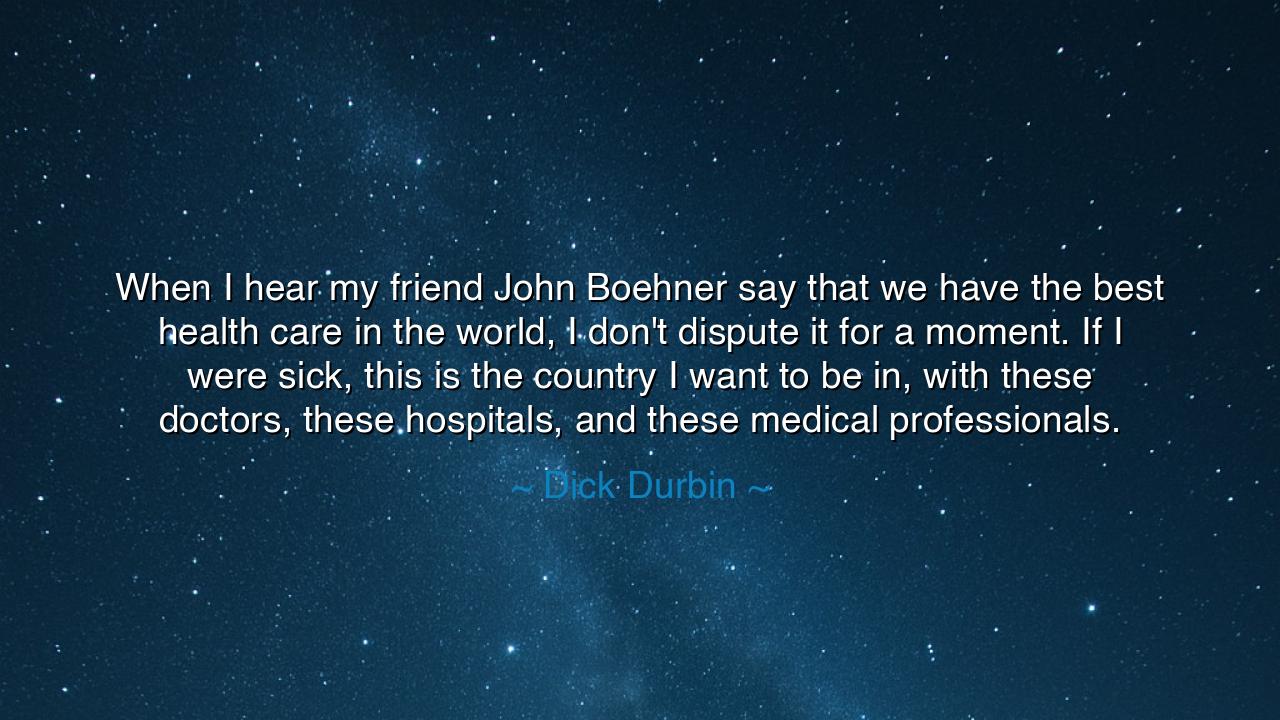
When I hear my friend John Boehner say that we have the best
When I hear my friend John Boehner say that we have the best health care in the world, I don't dispute it for a moment. If I were sick, this is the country I want to be in, with these doctors, these hospitals, and these medical professionals.






In the heart of every great civilization, there lies the question of what it means to truly care for the sick, the vulnerable, and the suffering. Dick Durbin, in his thoughtful words, acknowledges a powerful truth when he says, "When I hear my friend John Boehner say that we have the best health care in the world, I don't dispute it for a moment. If I were sick, this is the country I want to be in, with these doctors, these hospitals, and these medical professionals." His words are a recognition of the extraordinary accomplishments in medical care, yet also a subtle reminder of the limitations that still exist in a system that may be the best for some but is not accessible to all. This juxtaposition of excellence and inequity is a paradox worthy of reflection.
In ancient times, the healer was a revered figure, entrusted with not only physical restoration but also with the spiritual well-being of the community. The Greek physicians—such as Hippocrates, the father of medicine—were viewed as wise men whose role transcended simply mending broken bodies. Hippocrates understood that true health care is not just the practice of surgery or potion-making, but the cultivation of a system that honors the individual and community alike. Similarly, Durbin’s praise of the American healthcare system reflects an acknowledgment of a great tradition of medical excellence, yet his words also implicitly ask: "Who benefits from this excellence?"
Indeed, the ancient wisdom tells us that the greatness of a society can be measured by how it treats its most vulnerable. Plato believed that a truly just society would be one where the leaders care for all of their people, not just the privileged few. The question raised by Durbin’s statement, therefore, is not one of excellence in medical care but of accessibility—how can we call it the "best health care in the world" if it is not equally available to every citizen? This moral quandary mirrors the ancient conflicts between those who had the power to heal and those who were left to suffer in silence, excluded from the benefits of healing arts.
Consider the story of Florence Nightingale, a woman who became the face of compassionate care and modern nursing. During the Crimean War, Nightingale tended to wounded soldiers, revolutionizing the approach to hygiene and patient care. Her work was rooted in the belief that health care should not be an elitist privilege, but a universal right. Like Durbin’s reflection, Nightingale too understood the value of the medical professionals, hospitals, and medical technologies available, but her life's work ultimately called for a system of care that extended beyond the battlefield to the homes, the families, and the communities of every person.
Durbin’s words underscore an important truth that rings as loudly today as it did in the ancient world: the quality of healthcare is undeniably critical, but accessibility must always be the measure by which we judge the effectiveness of a system. Boehner’s statement may hold truth in the sense that America's medical institutions are among the most advanced in the world, but Durbin reminds us that to say we have the best health care is to ignore the disparities in access. Just as ancient societies struggled with the gap between the elite and the common people, we too must ask whether our modern system, despite its advances, truly serves all with the same level of care.
The lesson here is one of balance. True greatness in health care, and indeed in any noble endeavor, is not found solely in technological advancements or brilliant professionals, but in how these gifts are shared among the people. To claim excellence without ensuring equity is to miss the deeper purpose of medicine—which is, after all, to serve humanity as a whole. As Durbin reflects, it is essential that we not only recognize the best aspects of our health care system but also strive to make them available to all, regardless of status or resources.
In your own life, whether as a citizen, a leader, or a caregiver, strive to embody the virtue of equitable care. Acknowledge the brilliance of modern medicine, but also recognize where gaps exist, and seek to mend them. Let us ensure that compassion and justice are as central to our health care systems as innovation and excellence. In doing so, we not only honor the legacies of those who came before us but also set a precedent for future generations, ensuring that health care becomes a universal right that is available to all who need it. True excellence lies not in what we offer to the privileged few but in how we extend these gifts to the whole of society.






AAdministratorAdministrator
Welcome, honored guests. Please leave a comment, we will respond soon